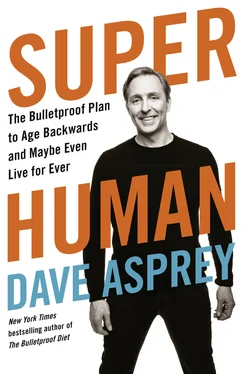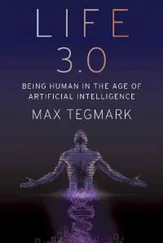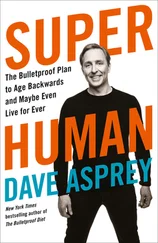This is no small consideration. When you eat a diet high in animal protein, you can expect a 75 percent increased risk of dying from all causes over eighteen years, a 400 percent increased risk of dying of cancer, and a 500 percent increased risk of diabetes compared to someone who restricts his or her animal protein. 11Totally not Super Human. Another set of studies found that restricting protein can help increase maximum life-span by 20 percent, probably because less protein means less methionine. 12
The type of protein you eat is as important to consider as how much protein you eat. If the protein in question is charred or deep-fried, there is no good amount to eat. Same goes if it’s from industrially-raised animals treated with antibiotics. But if the protein is from gently cooked grass-fed animals, wild fish, or plants (hemp is best), then there is a simple formula for the correct daily allowance: about 0.5 grams per pound of body weight for lean people; and about 0.6 grams per pound for athletes, older people (the risks associated with overconsumption of protein decrease after age sixty-five), and pregnant women.
If you’re obese like I was, sorry, but all that extra fat you’re carrying around doesn’t require protein, so subtract it from your body weight before figuring out how much protein to eat. For instance, when I weighed 300 pounds, let’s assume I was carrying an extra 100 pounds of fat. Take my weight (300), subtract my fat (100), and you end up with 200 pounds, so I should have aimed to eat 100 grams of protein (0.5 × 200 pounds). If you’re relatively heavy and have no idea of your body fat percentage or are just bad at math, assume you’re about 30 percent fat. So you’d eat 0.35 grams per pound of body weight.
Collagen protein is a special case. Given that it lacks the most aging amino acids and has all sorts of benefits for connective tissue, you can add another 20 or more grams of grass-fed collagen on top of your protein intake or use it as part of that number. Some days up to 50 percent of my protein comes from Bulletproof collagen.
Eating less protein will not give you less energy. Contrary to everything you’ve heard from most popular diets (even keto), protein is actually a terrible last-ditch fuel source for humans, worse than fat or carbohydrates. The process of turning amino acids from protein into energy creates a lot more waste than fat or carbs, and excess protein ferments in the gut and produces ammonia and nitrogen. This puts a huge load on the kidneys and liver. Instead of getting energy from protein, you want to consume just enough protein as building blocks to repair your tissues and maintain muscle mass, and then get energy from fat, fiber, and a few carbs, instead.
When you get this right, your cells can rebuild themselves with clean animal fats and protein (notice, you’re an animal, too), and your gut bacteria will actually transform fiber from vegetables into fatty acids, an ideal fuel source for your mitochondria. Add in excess protein, antibiotic-contaminated meat, and/or sugar, and your gut bacteria just won’t do the same thing.
Restricting protein intake also helps boost autophagy, your all-important cellular recycling program. By occasionally limiting how much protein you eat (you can still have a nice steak every once in a while), you force your cells to find every possible way to recycle proteins. In their search, they excrete waste products hiding in your cells, slowing down energy production. Temporary protein deficiency is a type of hormetic (beneficial) stress. In response to protein restriction, your body looks for other sources of energy. It is the equivalent of burning your trash to stay warm.
The same thing happens when you use intermittent fasting (simply eating all of your food within a shortened period of the day, usually between six to eight hours) as a type of hormetic stress. Intermittent fasting is incredibly useful in aiding fat loss, preventing cancer, building muscle, and increasing resilience. Done correctly, it’s one of the most painless high-impact ways to live longer.
Until recently, we did not fully understand why fasting was so beneficial. Then in 2019, scientists at the Okinawa Institute of Science and Technology discovered that just fifty-eight hours of fasting dramatically increases levels of forty-four different metabolites, including thirty that were previously unrecognized. 13Among other beneficial functions, these metabolites—substances formed during chemical processes—boost antioxidant levels in the body. And as we know, antioxidants are important for fighting off aging free radicals. All of these benefits can be explained by the fact that fasting dramatically boosts autophagy, 14keeping your cells young and healthy.
Fasting has profound effects, even at less than fifty-eight hours. Alternative day fasting, a form of intermittent fasting in which you eat every other day, helps prevent chronic disease and reduce triglyceride and low-density lipoprotein (LDL) cholesterol levels in as little as eight weeks. 15Intermittent fasting also increases your brain’s ability to grow and evolve by boosting neuronal plasticity (the brain’s ability to change throughout your life) and neurogenesis (the birth of new neurons). 16This can help ward off Alzheimer’s and cognitive decline.
As you might expect, when I started experimenting with intermittent fasting ten years ago, I was often left feeling cranky and cold around lunchtime, before my eating window opened. This is because I had not yet developed the metabolic flexibility from teaching my body to efficiently burn carbohydrates or fat. Today I can effortlessly fast for twenty-four hours because my metabolism is younger and my blood sugar levels have stabilized. Thankfully, there are now well-understood ways to make intermittent fasting painless, which you’ll read about later.
A BIG FAT LEAP OF FAITH
So, when it comes to aging, grains are bad, sugar is bad, fried stuff is bad, and too much or too little protein is bad. What about fat? Can you eat too much of it? Sure. But we need fats for reproductive health, temperature regulation, brain function, and shock absorption. Fat helps build the outer lining of your cells, which protects them from damaging substances. It also makes up the bile acids you need to digest foods, and vitamins A, E, D, and K are fat soluble, meaning your body needs fat to absorb them. Additionally, several important hormones, including leptin, which helps you feel satiated, are made from saturated fat and cholesterol. Fat is also the basis for the lining of your nerves, called myelin, which allows electricity to flow efficiently between nerves and is essential for avoiding degenerative diseases like multiple sclerosis.
Saturated fat in particular is so important that your body converts carbs to palmitate, a type of saturated fat, in a process called de novo lipogenesis. Without this ability, you’d die. That’s how critical saturated fat is. Your body then converts palmitate into other saturated and monounsaturated fats necessary for cell membranes, but it can’t make enough polyunsaturated omega-6 and omega-3 fats. That’s why you have to eat them. Yet the myth that eating fat and cholesterol will make you fat and give you heart disease still somehow persists. You read earlier that it’s your gut bacteria and not dietary cholesterol that creates plaques that build up in arteries. The evidence is in, and the fats you eat that contain cholesterol are not the enemy, as we’ve been told.
When you eat enough of the right fats without excess carbs or protein, your body learns to efficiently burn fat for fuel. If you eat excess carbs or protein, your body burns those first. Normally, your body converts carbohydrates to make glucose, which your mitochondria use to produce energy. When you run out of carbohydrates, you start converting fat to glycerol for energy. The liver produces ketones as a by-product of this fat metabolism, and your mitochondria burn those ketones instead of glucose in a more efficient form of energy production. Ketosis is a state your body enters when you have a lot of ketones in your blood and are burning additional fat … or when you eat a special type of saturated fat that converts to ketones in your body. More on that later.
Читать дальше












